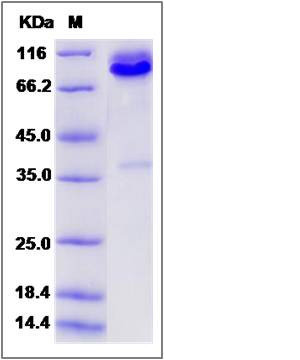Rat Syndecan-1 / SDC1 / CD138 Protein (Fc Tag)
SDC1, Synd1
- 100ug (NPP3124) Please inquiry
| Catalog Number | P80344-R02H |
|---|---|
| Organism Species | Rat |
| Host | Human Cells |
| Synonyms | SDC1, Synd1 |
| Molecular Weight | The recombinant rat SDC1/Fc is a disulfide-linked homodimer. The reduced monomer comprises 472 amino acids and has a predicted molecular mass of 51.2 kDa. The apparent molecular mass of the protein is approximately 92 kDa in SDS-PAGE under reducing conditions. |
| predicted N | Gln 23 |
| SDS-PAGE |  |
| Purity | > 90 % as determined by SDS-PAGE |
| Protein Construction | A DNA sequence encoding the rat SDC1 (P26260) (Met1-Lys253) was expressed, fused with the Fc region of human IgG1 at the C-terminus. |
| Bio-activity | 1. Measured by its binding ability in a functional ELISA. Immobilized human PTN (P10288-HNAB) at 10 μg/ml (100 μl/well) can bind rat SDC1-Fc (P80344-R02H), The EC50 of rat SDC1-Fc (P80344-R02H) is 0.35-0.81 μg/ml. 2. Measured by its binding ability in a functional ELISA. Immobilized mouse PTN (P51000-MNAB) at 10 μg/ml (100 μl/well) can bind rat SDC1-Fc, The EC50 of rat SDC1-Fc is 0.4-1.1 μg/ml. |
| Research Area | Cancer |Invasion microenvironment |Adhesion molecule |Extracelluar matrix |proteoglycans |
| Formulation | Lyophilized from sterile PBS, pH 7.4 1. Normally 5 % - 8 % trehalose, mannitol and 0.01% Tween80 are added as protectants before lyophilization. Specific concentrations are included in the hardcopy of COA. |
| Background | Syndecan-1 also known as SDC1 and CD138, is the most extensively studied member of the syndecan family. It is found mainly in epithelial cells, but its expression is developmentally regulated during embryonic development. Syndecan-1/SDC1/CD138 has been shown to mediate cell adhesion to several ECM molecules, and to act as a coreceptor for fibroblast growth factors, potent angiogenic growth factors involved also in differentiation. Syndecan-1/SDC1/CD138 expression is reduced during malignant transformation of various epithelia, and this loss correlates with the histological differentiation grade of squamous cell carcinomas, lacking from poorly differentiated tumours. In squamous cell carcinomas of the head and neck, positive syndecan-1 expression correlates with a more favourable prognosis. Experimental studies on the role of Syndecan-1 in malignant transformation have shown that Syndecan-1/SDC1/CD138 expression is associated with the maintenance of epithelial morphology, anchorage-dependent growth and inhibition of invasiveness in vitro. |
| Reference |
